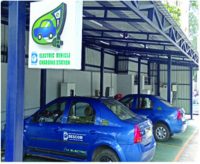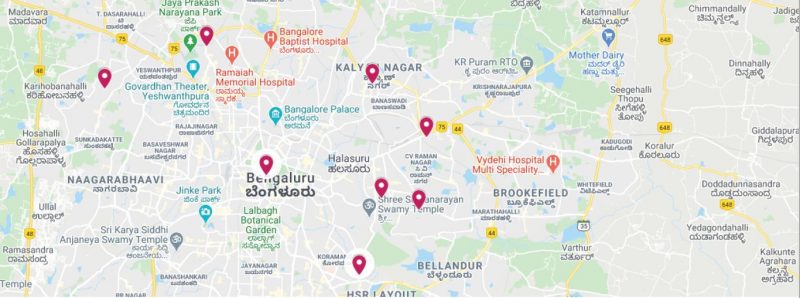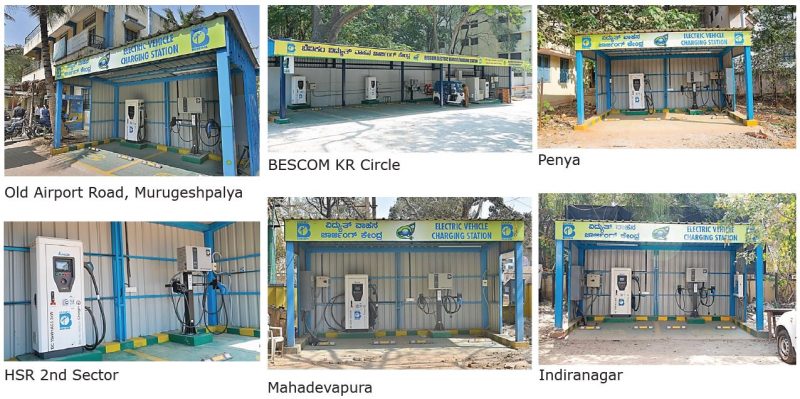
CHALLENGES
We are all well aware that Global Warming has become one of the biggest threats to the planet. Today, transport contributes approximately one quarter of all energy related carbon dioxide emissions to the atmosphere, which is set to reach one-third – thereby growing faster than any other sector. The global passenger car fleet is projected to double by 2050, with the majority of growth taking place in developing markets like India. A radical solution to combat greenhouse gas emissions and air pollution is to adopt, support, and scale up electric mobility. The strongest argument in favour of this is the simple fact that e-mobility moves away from existing carbon-emitting fossil fuels and instead uses energy from electrical power sources through external charging options.
The Benefits of e-Mobility
 Until now, car mobility has been almost entirely dependent on imported, rare and increasingly more expensive (at least in the long-term) oil. This means that nearly all industrialized and newly-industrialized countries are faced with the challenge of reducing traffic-related CO2-emissions and pollution and the dependence on oil imports.
Until now, car mobility has been almost entirely dependent on imported, rare and increasingly more expensive (at least in the long-term) oil. This means that nearly all industrialized and newly-industrialized countries are faced with the challenge of reducing traffic-related CO2-emissions and pollution and the dependence on oil imports.
From an environmental standpoint, e-mobility is an excellent plan in answering the global clamour for de-carbonization. Its benefits are far-reaching and deeply impactful across a wide range of areas:
- It will help reduce the amount of energy required and utilized by the transportation sector.
- It challenges car makers and manufacturers to think outside the box. As competition increases, they are likely to put in more effort and resources into making vehicles that are better – more energy-efficient, lighter, and offer higher performance. Quite the win-win situation.
- It will create employment opportunities. The automotive industry will be more confident in the development of electric vehicles, and they will need talent and manpower to do it.
- Globalized standards and e-mobility technology will minimize barriers to trade, allowing for harmonious working relationships among manufacturers and among nations.
- It will increase vehicle efficiency and reduce operational costs.
- It will ensure compliance with carbon emission regulations.
- It will reduce energy needs. The design of recent e-mobility technologies s closely linked to the creation of smart power grids which are expected to be the source of the energy that will power the electric vehicles. Since the electric vehicle is more efficient, that means the smart power grid will also be more efficient.
BESCOM’s Plan on Public EV Chargers

Government of Karnataka issued the Electric Vehicle & Energy Storage Policy 2017 during September 2017 with a long term vision to ensure Karnataka’s position as a preferred investment destination for electric vehicle manufacturers. The primary goals of the program include support for Charging Infrastructure, R&D, Skill Development, and EV Manufacturing Parks, amongst others.
This endeavour envisions attracting investments of INR 31,000 crore (USD 4,779.53 million) and creating employment opportunities on both the supply and demand fronts, for up to 55,000 individuals. Moreover, a reduction in road tax and registration tax will be offered as indirect incentives for Hybrid and Electric Vehicles.
This is a huge step towards encouraging more and more citizens to adopt e-mobility vehicles which already have some hard-to-ignore benefits like being cheaper to maintain (low dependence on fossil fuels) and zero emissions that would otherwise damage the environment. Further, BESCOM is identified as the ‘State Nodal Agency’ for setting up EV Charging Infrastructure in across the state. Considering the year-on-year sharply escalating pollution levels in the city, BESCOM engaged Delta to introduce a much-needed reform: EV Charging Stations installed in several locations across the city.
Delta Solutions

Delta’s mission is to provide innovative, clean, and energy-efficient solutions for a better tomorrow. With over 40 years of expertise in power technologies, Delta Group delivers energy-efficient EV charging solutions including AC EV charger, DC quick charger, and Site Management System.
Delta’s EV chargers offer high-performance power efficiency up to 94%, support communication functions for system integration and have obtained global safety certifications such as UL, IEC, CHAdeMO, CQC and CNS.
The comprehensive EV charging solutions are able to fulfil the needs for various applications such as parking, workplace, fleet, residential buildings, to name a few. Delta has successfully completed numerous installations for several applications and segments around the world.
Delta has a wide portfolio of EV Charging Products from which it has provided BESCOM the combination for both AC and DC Chargers. This combination allows the users to charge their vehicles as per their requirements based on different EV Charging Standards and Charging Times.

Note: Both Bharat Chargers are based on Bharat EV Charging protocol.
In addition, the mobile application for managing the EV Charging Stations is a great step in providing the best customer experience. The provided mobile application is compatible with android as well as iOS.
Some of its primary features include finding charging stations, checking charging station details (calling, navigating, booking slots, viewing status and availability, initiating charging via the app, and more). It also supports multiple payment mechanisms.
The RFID card works as the unique id of each user in the charging stations, thereby assisting in registering the details of each session while also maintaining the security of each unique user account.
Real-Time Success
Some prominent highlights of the success achieved by BESCOM so far are as follows:
- Dedicated EV Cell at BESCOM, the promotional electricity tariff for EV Charging Stations (Rs. 5/unit) and the five EVs in use at the Energy – Department, KERC, and BESCOM.
- Bringing about a fleet conversion of 50% of the existing convention engine vehicles in Corporate Office, BESCOM into Electric Vehicles.
- BESCOM with the support of the Transport Department, GoK has awarded work to Delta Electronics for 126 EV Charging Units (26 DC and 100 AC Charging Units) across Bengaluru City.
Real-Time Success:
It is noteworthy that the EV Charging Infrastructure workgroup consisting of stakeholder departments viz. Transport, Commerce & Industries, BBMP, KREDL, BMTC, BMRCL, KIADB, KHB, KSRTC, ESCOMs & KPTCL is formed for seamless coordination for setting up EV Charging Stations in the city.
The Future is Now
It’s been an honour to have initiated and executed the first largest network of public EV Charging Stations in the state of Karnataka and we hope this trail of success inspires peers to follow suit. At Delta, we truly believe that diligently working towards sustained development of this segment can lead to a better future – for industries, people, flora, fauna, and the environment alike.

